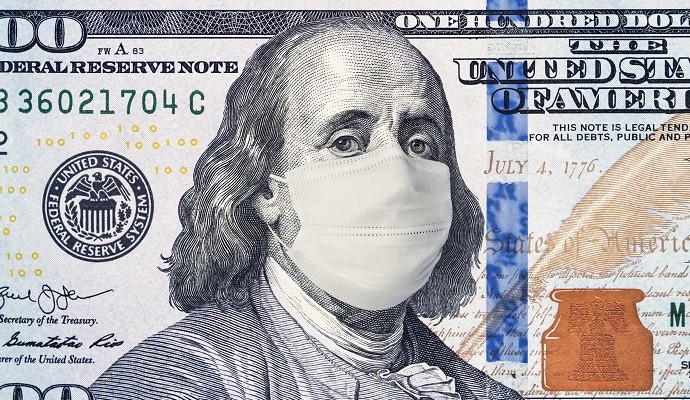Lawmakers Provide Accelerated, Advance Medicare Payment Relief
The latest continuing resolution extends recoupment under the Accelerated and Advance Payment Programs and lowers the interest rate on outstanding balances.

Source: Getty Images
- A continuing resolution signed by President Trump early Thursday morning included key healthcare provisions, including an extension for providers who had their Medicare payments advanced during the COVID-19 public health emergency.
CMS turned on the Medicare Accelerated and Advance Payment Programs at the start of the pandemic when it was clear hospitals and other providers were struggling with the sudden drop in admissions and office visits.
Under the program, the agency advances projected Medicare reimbursement and recoups the advancement by withholding Medicare payments. Recoupment typically starts 120 days after the first payment was received. The period was extended for the COVID-19 public health emergency to 210 days.
At the start of the COVID-19 pandemic, the program doled out nearly $60 billion to over 21,000 Part A providers and $40.4 billion to almost 24,000 Part B providers before CMS shut down half the program in April, when HHS started distributing emergency relief through the Provider Relief Fund.
The law will give providers a year before CMS will recoup reimbursement paid under the Accelerated and Advanced Payment Programs during the emergency period. It also states that CMS can only offset a provider’s payment by 25 percent for the first 11 months of repayment, then 50 percent for the succeeding six months.
READ MORE: In the Final Hours, Providers Prepare for Repayment of Medicare Loans
CMS will withhold Medicare payments for a total of 29 months from the date of the first payment under the program before requiring providers to repay the outstanding balance in full.
Additionally, the law reduced the interest rate on outstanding balances to 4 percent from 10.25 percent.
Another key healthcare provision in the law included a delay of the Medicaid Disproportionate Shared Hospital (DSH) payment cuts.
The law is a win for providers who have been calling on policymakers for months to give them more favorable repayment terms considering the ongoing public health emergency.
“These changes are vital to helping the nation’s teaching hospitals and physician faculty continue to provide critical care to patients now and in the future,” David J. Skorton, MD, president and CEO of the Association of American Medical Colleges (AAMC), said in a statement late Wednesday.
READ MORE: Should Physician Practices Return Paycheck Protection Program Loans?
Chip Kahn, the president and CEO of the Federation of American Hospitals (FAH), also called the revisions to payment recoupment “fair and appropriate” in an earlier statement on the continuing resolution. FAH launched a campaign over the summer to get Congress to extend recoupment and provide more favorable repayment terms for providers.
The American Medical Association (AMA) had also backed the continuing resolution shortly before the House passed it in a 359 – 57 vote last week.
The law, however, is not a permanent solution, the American Hospital Association (AHA) reminded the industry.
“We will continue to work with Congress and the Administration to find a permanent solution, including loan forgiveness of these payments,” Rick Pollack, the hospital group’s president and CEO, said in a statement yesterday.
Pollack also said the group will advocate for extending the delay of the Medicaid DSH cuts for the entire 2021 fiscal year.
READ MORE: Healthcare Still Waiting on $121B in COVID-19 Financial Relief
Hospitals are on par to lose at least $323 billion in 2020 because of the COVID-19 pandemic, AHA recently projected. Additionally, physician practices are still trying to recover from revenue dips of at least 50 percent from the start of the pandemic, the AMA stated.
But loan forgiveness is unlikely in this case, according to Judy Waltz, partner at Foley & Lardner LLP and co-chair of Foley’s Health Care Industry Team.
“Unlike Provider Relief Funds, those funds came from Medicare trust funds, and that's an important distinction,” Waltz recently told RevCycleIntelligence.
The Hospital Insurance Trust Fund is close to insolvency, according to projections from the Medicare Board of Trustees. Additionally, the Supplementary Medical Insurance Trust Fund, which funds Medicare Part B, relies in part on beneficiary premiums unlike the Provider Relief Funds, which hinge on allocations from the federal government.
“Medicare isn't in a position to do that,” Waltz explained. “If [loan forgiveness] were to happen, Congress would have to authorize enough money to make both trust funds whole.”
Industry groups like the AAMC are still advocating for a larger COVID-19 legislative relief package despite changes to the programs under the continuing resolution. However, efforts in Congress have stalled since the CARES Act and lawmakers left Wednesday night without a bill on the table.
But Waltz contended that, “as bad as times are now, we don’t want to sell off our future.” In other words, more comprehensive relief like loan forgiveness could dry up an already dwindling Medicare Trust Fund.
Instead, Waltz advised providers to try to get the accelerated or advanced payments paid off as soon as possible.
“Try to get it paid off before it turns into an overpayment because, at that point, the interest kicks in and Medicare gets very aggressive about collections,” Waltz stated.
Once interest starts to accrue on the overpayments, other players like the Department of Treasury can also get involved if providers fail to pay what is owed, Waltz also warned. These agencies can take more than a provider’s Medicare reimbursements to recoup the loan – for example, their tax refunds.
Medicare also has limited authority to settle overpayments with providers to prevent the advancement from defaulting.
“That was one [idea] that's been kicked around not with respect to this continuing resolution,” Waltz said. “But Medicare's authorities on that front are really limited, and if the continuing resolution wanted to do that, it would have and it would have been a major revision to the existing statutes and regulations. That was another one of those dreams that just wasn't going to happen.”
